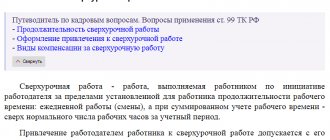Guarantees when signing an employment contract
According to the Labor Code of the Russian Federation, official employment of an employee presupposes the need to draw up a work contract with an open-ended or fixed-term nature of work. At the same time, exceptional cases are established in which it is permissible to sign a fixed-term agreement with an employee. The conclusion of an employment contract implies the formation of new legal relations between the head of the organization and the hired employee. Labor legislation regulates the cooperation of the parties through developed regulatory and legal regulations, which provides special guarantees to ensure compliance with the rights and interests of the parties. For employees who have entered into an open-ended and fixed-term employment contract, the list of legal guarantees is similar.
The main guarantees arising when drawing up employment contracts are presented in article No. 64 of the Labor Code of the Russian Federation . The content of the article reflects the legal aspects of labor relations that arise between an employer and a subordinate at the stage of interview and signing of a work contract. The guarantees outlined in the article are aimed at suppressing discrimination against persons wishing to obtain work from a particular employer. Such guarantees include:
- Prohibition of unreasonable refusal of employment for a vacant position. Refusal to apply for a job without legal grounds is regarded as an act of discrimination against a citizen, which violates his rights. This also applies to cases where the head of an enterprise refuses to hire a pregnant woman or an employee with young children;
- If the employer refuses to draw up an employment contract for unfounded reasons, the applicant for the position has the right to demand that the person draw up a written refusal specifying the reasons for his decision;
- The Labor Code of the Russian Federation provides citizens whose rights and interests were infringed upon when concluding an employment contract with the opportunity to bring the unscrupulous head of the organization to justice.
The legal guarantees outlined in the article serve as the basis for the protection of workers' rights. This is due to the fact that citizens who want to get a job are free in their choice and have the right to independently make a decision regarding the conclusion or refusal of an employment contract with the employer. In turn, a legal entity often abuses the rights of workers, which creates the basis for the development of guarantees that apply to applicants for a vacant position.
In what cases is it prohibited by law to refuse a citizen employment?
There are a number of situations in which a citizen cannot be refused employment. All of them are regulated by one or another regulatory acts of the Russian Federation. An employer will break the law if:
- will refuse to employ a woman because she is pregnant or has minor children;
- will refuse employment to a citizen who has been invited in writing to work from another company (relevant only in the first month after his dismissal);
- will not hire a person who has been selected for any of the positions prescribed in Articles 16 and 17 of the Labor Code;
- will not hire a person who is a deputy of the holder of the above positions;
- will refuse employment to a person in respect of whom the court has made a contrary decision;
- will not hire a disabled person sent to the enterprise as part of the job quota;
- will not hire an HIV-infected citizen , motivating his decision only by the presence of the corresponding disease;
- will refuse employment to a citizen due to his lack of registration at his current place of residence;
- will not accept a released trade union employee whose term of duties has already expired;
- will not hire a person, citing his affiliation (or lack thereof) with one or another trade union organization;
- will not employ a citizen due to gender, racial or other prejudices (the full list is presented in Article 64 of the Labor Code of the Russian Federation, as well as Article 19 of the Constitution).
This list of situations is not complete. Therefore, if a citizen believes that his rights have been violated, but the situation does not coincide with any of the above cases, he has the right to appeal to the court.
When are warranties not violated?
The guarantees provided during the execution of the contract are not considered violated if the employer is strictly guided by all the provisions of the Labor Code of the Russian Federation. When applying for employment, every citizen has the right to receive legal advice regarding compliance of the clauses of the contract with labor legislation. The law establishes specific rules according to which any motives that do not correspond to the business skills and professionalism of the applicant are considered discrimination. Exceptions are also clearly defined in federal law.
Social guarantees provided for employees
The considered labor guarantees provided to persons looking for work are by no means a definitive list. The provisions of labor legislation, and more specifically, Articles 212 and 265, define the following list of social guarantees that workers can and should use, including during periods of incapacity:
- Systematic referral of employees who perform official duties under the influence of harmful and dangerous factors to undergo medical examinations in order to establish their level of health;
- Mandatory consideration in the employment contract of issues related to the provision of insurance services to the employee and the monthly deduction of the necessary amounts to the Pension Fund of the Russian Federation;
- Providing a person whose work involves harmful and dangerous factors with additional days of rest to the annual vacation period, which are also subject to payment by the employer;
- Timely provision of wages to all employees at least twice a month. The amount of the minimum monthly income (salary) must be fixed in the provisions of the employment contract; reducing its amount at the sole request of the employer is unacceptable;
- Establishing a schedule for the employee, as well as a work and rest regime that would satisfy his work interests, especially if the citizen is raising young children.
How to legally refuse to hire a pregnant woman
Labor Code of the Russian Federation, you can already go to court to appeal the refusal to conclude an employment contract with you. The main thing is to do this no later than 3 months after the incident. And finally, the most difficult thing is to convince the court that you are right. As evidence, you should present facts confirming your professional competence - diplomas, recommendations from previous places of work, test results, certificates of advanced training. Witness testimony would also be useful, for example, a recording of a telephone conversation during which the true reasons for the refusal were reported, or an email with similar content. If you provide the court with an audio or video recording on electronic or other media, then it is necessary to explain who, when and under what conditions made the recording.
Can a pregnant woman be refused a job?
Info
According to the Labor Code of the Russian Federation, he can also receive annual paid leave at any time while his wife is on maternity leave, regardless of the length of service in this organization and the vacation schedule.
A different work schedule during pregnancy If a pregnant woman has already received a certificate confirming her position, she can certainly count on a reduced working day or week. Choose one thing and write a statement addressed to your manager.
Based on this document, an additional agreement to the employment contract is drawn up. But keep in mind that when calculating wages, only the time actually worked will be taken into account. And Art. 259 of the Labor Code of the Russian Federation prohibits sending expectant mothers on any business trips, requiring them to perform duties on weekends, overtime and night work. In accordance with Art.
Guarantees for the protection of the rights of workers subject to gender discrimination
Unfortunately, there are often managers who infringe on the labor rights and interests of female subordinates. As a rule, this is expressed in the provision of additional labor functions to women that are not fixed in the contract, or in a deliberate reduction in wages compared to the wages of male workers. Also, you can often find in the provisions of an employment contract a ban on marriage and the birth of children during the period of cooperation with a given employer. All of the above restrictions are a serious violation of the norms of the Labor Code of the Russian Federation and worker guarantees. Every woman who has been subjected to gender discrimination by her boss has the right to appeal to higher authorities in order to bring the unscrupulous official to justice.
Kinds
The list of legal guarantees presented in the content of article No. 64 of the Labor Code of the Russian Federation is not exhaustive. Labor legislation provides for additional guarantees that are established and apply to employees after concluding a work contract.
Social guarantees defined by articles of the Labor Code of the Russian Federation under numbers 212 and 265:
- Mandatory and regular medical examinations when a citizen is employed in an enterprise with harmful and dangerous working conditions;
- The content of the employment contract must include a clause that concerns the terms of insurance and payment of contributions for a subordinate to the Pension Fund;
- The law provides for the guarantee of the worker to receive annual paid leave or additional days off based on the specific nature of the work environment;
- Labor legislation obliges enterprise managers to make full and timely payment for professional activities in accordance with the terms of the agreement of the parties;
- Establishing an optimal work and rest schedule for a subordinate. The indicated point refers to the essential terms of the employment contract and is subject to detailed consideration and clarification in the text of the working agreement.
Guarantees for the protection of the rights of workers who are subject to gender discrimination. There are often cases in which employers infringe on the rights of female employees by giving them additional responsibilities, providing them with lower wages compared to the male half of the team, or forcing them to sign an agreement prohibiting marriage or having children. Such actions indicate a violation by the employer of the legal guarantees of workers. Therefore, workers who have been discriminated against have the opportunity to protect their rights by bringing the head of the enterprise to justice.
When establishing a trial period:
- Establishing a probationary period involves drawing up an employment contract. If the document was not concluded, this will indicate an offense on the part of the legal entity;
- The duration of the internship must comply with the limits established by law. The maximum duration of the probationary period for a regular employee cannot exceed three months. In exceptional cases, this period is extended to six months;
- Another guarantee provided for by the Labor Code of the Russian Federation is the establishment of similar rights and amounts of payments for work for an intern as for main employees.
Guarantee of the safety of personal information of employees:
- Personal information about an employee can only be obtained from a candidate for a position when concluding an employment contract or from a third party with his consent;
- It is not permitted for an employer to illegally obtain information that concerns the religious or political views of a subordinate;
- The clauses of the work contract act as a guarantee of the safety and use of information about the employee not only by the employer, but also by third parties.
For the employer
Legislative provisions relating to legal guarantees when concluding an employment contract, to a greater extent, ensure respect for the rights of working citizens. However, it is important to note that, for employers, a list of guarantees is also established when signing an employment contract with a new employee.
These include:
- Mandatory compliance by the employee with the provisions of the employment contract;
- Timely notification of the employer about the upcoming dismissal of a subordinate at his own request and working out the legal two weeks;
- A significant guarantee for the employer will be the establishment of financial liability in relation to the employee. It is permissible to establish financial obligations if the employee performs professional duties with the employer’s property or is responsible for large sums of money;
- The guarantee of safety and non-disclosure of state or commercial secrets of the enterprise indicated in the Labor Code of the Russian Federation and in the content of the employment contract.
Additional guarantees
In addition to the basic guarantees provided for by law, additional guarantees are established for certain categories of workers when concluding an employment contract. The Labor Code of the Russian Federation obliges employers to provide and comply with additional benefits and privileges to the following groups of employees:
- Pregnant employees;
- For parents raising children on their own;
- Parents of incapacitated children;
- Employees who have not reached the age of majority;
- Workers with a degree of disability.
These categories of employees have a legal right to additional benefits when hiring and in the process of performing professional duties. So, for example, pregnant women can get time during the working day to visit a doctor, minor workers cannot be involved in working at night and overtime, disabled people have a preferential right to retain a position when the number of staff is reduced. Also, additional guarantees when concluding an employment contract include: payment of compensation and bonuses, disability benefits, additional paid leave.






